Tax Law: Implications of Harding Cases for Australian Expatriates
VerifiedAdded on 2022/11/23
|10
|2593
|155
Essay
AI Summary
This essay provides a comprehensive analysis of the Harding v Commissioner of Taxation cases, focusing on the implications for Australian expatriates. It explores the complexities of tax residency, the application of the ordinary concept test, and the significance of a 'permanent place of abode.' The essay examines the tax implications for Australians living abroad, considering factors such as worldwide income taxation, double taxation treaties, and potential trailing tax liabilities. It delves into the specifics of the Harding cases, including the initial Federal Court decision and the subsequent reversal by the Full Federal Court, highlighting the evolving interpretation of key legal concepts. The essay also discusses the factors considered by the courts in determining residency status, such as the taxpayer's intentions, financial affairs, and the nature of their accommodation. The analysis underscores the importance of understanding these legal principles for individuals working or considering working overseas, emphasizing the need for clarity and certainty in Australian tax law to avoid potential financial consequences. The essay concludes by summarizing the key findings and the implications of the Harding cases for expatriates and the broader interpretation of tax residency in Australia.
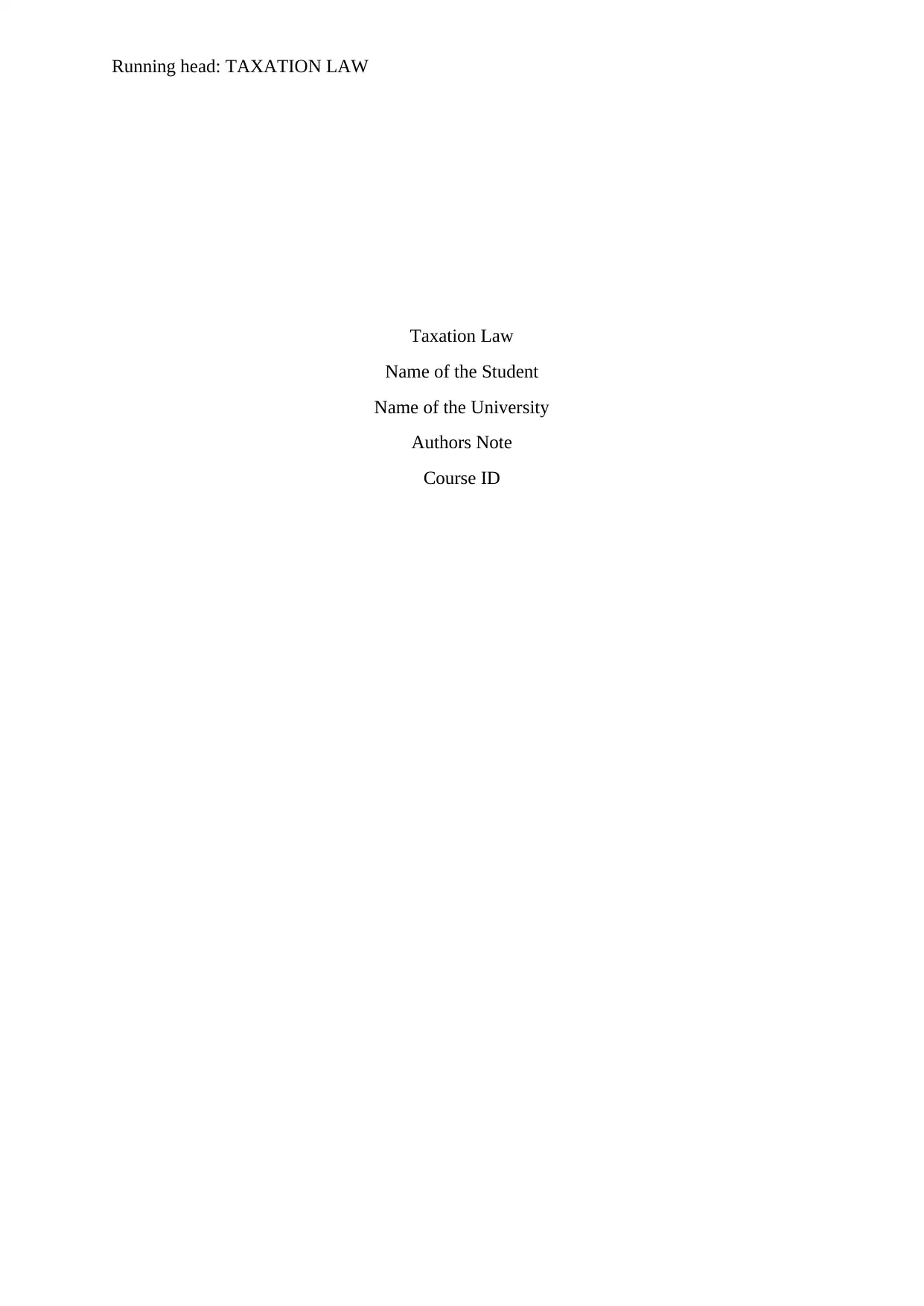
Running head: TAXATION LAW
Taxation Law
Name of the Student
Name of the University
Authors Note
Course ID
Taxation Law
Name of the Student
Name of the University
Authors Note
Course ID
Paraphrase This Document
Need a fresh take? Get an instant paraphrase of this document with our AI Paraphraser
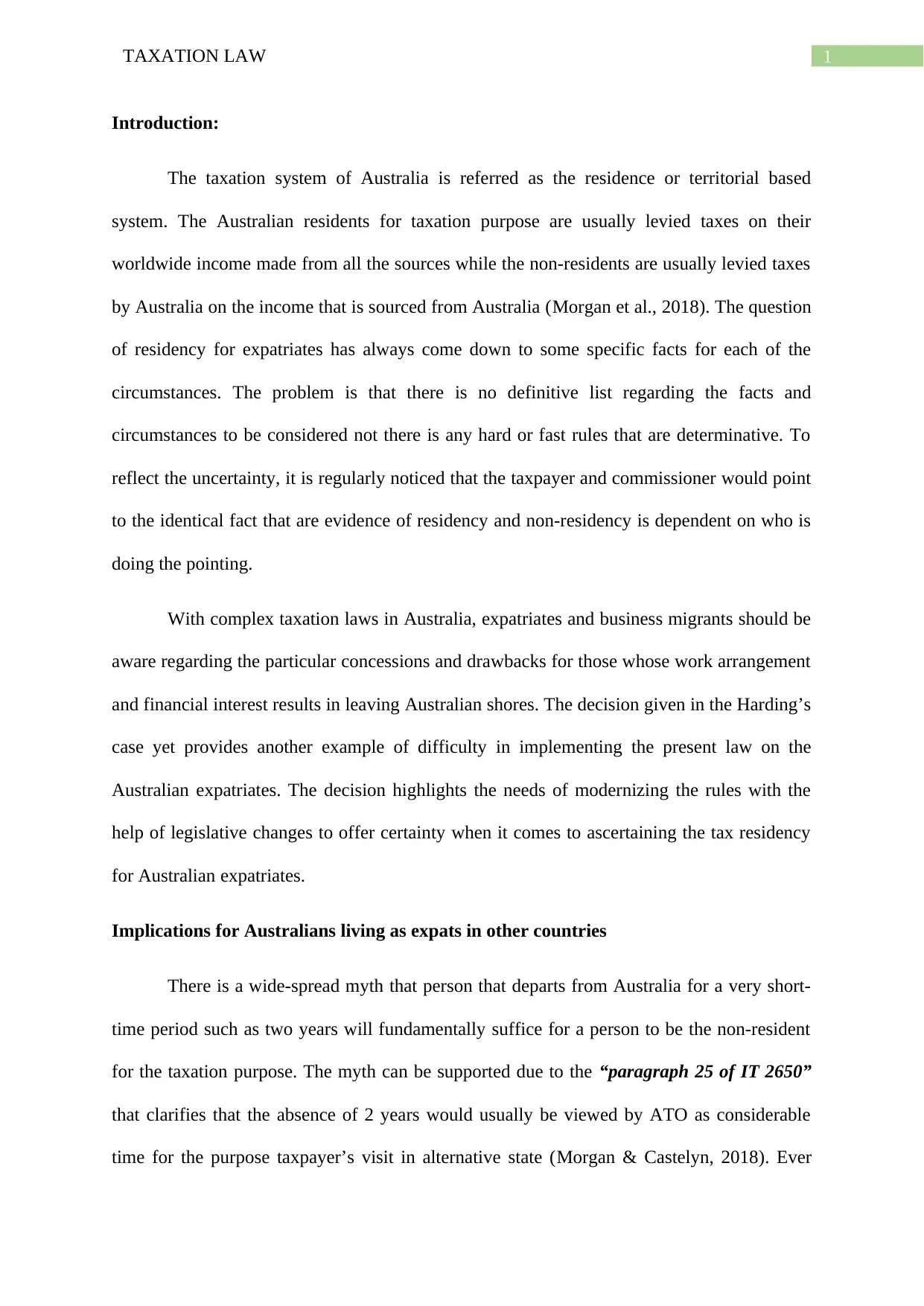
1TAXATION LAW
Introduction:
The taxation system of Australia is referred as the residence or territorial based
system. The Australian residents for taxation purpose are usually levied taxes on their
worldwide income made from all the sources while the non-residents are usually levied taxes
by Australia on the income that is sourced from Australia (Morgan et al., 2018). The question
of residency for expatriates has always come down to some specific facts for each of the
circumstances. The problem is that there is no definitive list regarding the facts and
circumstances to be considered not there is any hard or fast rules that are determinative. To
reflect the uncertainty, it is regularly noticed that the taxpayer and commissioner would point
to the identical fact that are evidence of residency and non-residency is dependent on who is
doing the pointing.
With complex taxation laws in Australia, expatriates and business migrants should be
aware regarding the particular concessions and drawbacks for those whose work arrangement
and financial interest results in leaving Australian shores. The decision given in the Harding’s
case yet provides another example of difficulty in implementing the present law on the
Australian expatriates. The decision highlights the needs of modernizing the rules with the
help of legislative changes to offer certainty when it comes to ascertaining the tax residency
for Australian expatriates.
Implications for Australians living as expats in other countries
There is a wide-spread myth that person that departs from Australia for a very short-
time period such as two years will fundamentally suffice for a person to be the non-resident
for the taxation purpose. The myth can be supported due to the “paragraph 25 of IT 2650”
that clarifies that the absence of 2 years would usually be viewed by ATO as considerable
time for the purpose taxpayer’s visit in alternative state (Morgan & Castelyn, 2018). Ever
Introduction:
The taxation system of Australia is referred as the residence or territorial based
system. The Australian residents for taxation purpose are usually levied taxes on their
worldwide income made from all the sources while the non-residents are usually levied taxes
by Australia on the income that is sourced from Australia (Morgan et al., 2018). The question
of residency for expatriates has always come down to some specific facts for each of the
circumstances. The problem is that there is no definitive list regarding the facts and
circumstances to be considered not there is any hard or fast rules that are determinative. To
reflect the uncertainty, it is regularly noticed that the taxpayer and commissioner would point
to the identical fact that are evidence of residency and non-residency is dependent on who is
doing the pointing.
With complex taxation laws in Australia, expatriates and business migrants should be
aware regarding the particular concessions and drawbacks for those whose work arrangement
and financial interest results in leaving Australian shores. The decision given in the Harding’s
case yet provides another example of difficulty in implementing the present law on the
Australian expatriates. The decision highlights the needs of modernizing the rules with the
help of legislative changes to offer certainty when it comes to ascertaining the tax residency
for Australian expatriates.
Implications for Australians living as expats in other countries
There is a wide-spread myth that person that departs from Australia for a very short-
time period such as two years will fundamentally suffice for a person to be the non-resident
for the taxation purpose. The myth can be supported due to the “paragraph 25 of IT 2650”
that clarifies that the absence of 2 years would usually be viewed by ATO as considerable
time for the purpose taxpayer’s visit in alternative state (Morgan & Castelyn, 2018). Ever
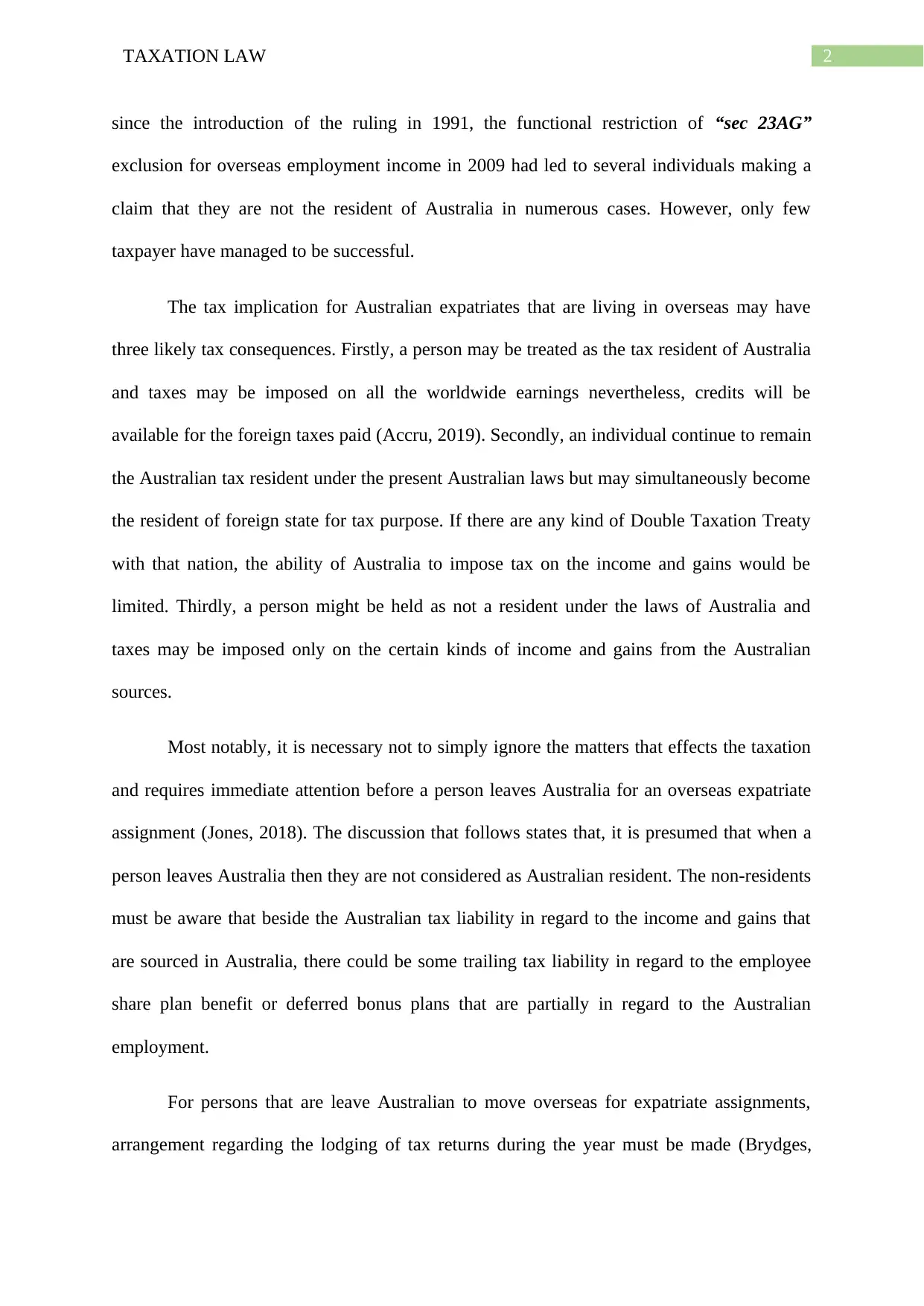
2TAXATION LAW
since the introduction of the ruling in 1991, the functional restriction of “sec 23AG”
exclusion for overseas employment income in 2009 had led to several individuals making a
claim that they are not the resident of Australia in numerous cases. However, only few
taxpayer have managed to be successful.
The tax implication for Australian expatriates that are living in overseas may have
three likely tax consequences. Firstly, a person may be treated as the tax resident of Australia
and taxes may be imposed on all the worldwide earnings nevertheless, credits will be
available for the foreign taxes paid (Accru, 2019). Secondly, an individual continue to remain
the Australian tax resident under the present Australian laws but may simultaneously become
the resident of foreign state for tax purpose. If there are any kind of Double Taxation Treaty
with that nation, the ability of Australia to impose tax on the income and gains would be
limited. Thirdly, a person might be held as not a resident under the laws of Australia and
taxes may be imposed only on the certain kinds of income and gains from the Australian
sources.
Most notably, it is necessary not to simply ignore the matters that effects the taxation
and requires immediate attention before a person leaves Australia for an overseas expatriate
assignment (Jones, 2018). The discussion that follows states that, it is presumed that when a
person leaves Australia then they are not considered as Australian resident. The non-residents
must be aware that beside the Australian tax liability in regard to the income and gains that
are sourced in Australia, there could be some trailing tax liability in regard to the employee
share plan benefit or deferred bonus plans that are partially in regard to the Australian
employment.
For persons that are leave Australian to move overseas for expatriate assignments,
arrangement regarding the lodging of tax returns during the year must be made (Brydges,
since the introduction of the ruling in 1991, the functional restriction of “sec 23AG”
exclusion for overseas employment income in 2009 had led to several individuals making a
claim that they are not the resident of Australia in numerous cases. However, only few
taxpayer have managed to be successful.
The tax implication for Australian expatriates that are living in overseas may have
three likely tax consequences. Firstly, a person may be treated as the tax resident of Australia
and taxes may be imposed on all the worldwide earnings nevertheless, credits will be
available for the foreign taxes paid (Accru, 2019). Secondly, an individual continue to remain
the Australian tax resident under the present Australian laws but may simultaneously become
the resident of foreign state for tax purpose. If there are any kind of Double Taxation Treaty
with that nation, the ability of Australia to impose tax on the income and gains would be
limited. Thirdly, a person might be held as not a resident under the laws of Australia and
taxes may be imposed only on the certain kinds of income and gains from the Australian
sources.
Most notably, it is necessary not to simply ignore the matters that effects the taxation
and requires immediate attention before a person leaves Australia for an overseas expatriate
assignment (Jones, 2018). The discussion that follows states that, it is presumed that when a
person leaves Australia then they are not considered as Australian resident. The non-residents
must be aware that beside the Australian tax liability in regard to the income and gains that
are sourced in Australia, there could be some trailing tax liability in regard to the employee
share plan benefit or deferred bonus plans that are partially in regard to the Australian
employment.
For persons that are leave Australian to move overseas for expatriate assignments,
arrangement regarding the lodging of tax returns during the year must be made (Brydges,
⊘ This is a preview!⊘
Do you want full access?
Subscribe today to unlock all pages.

Trusted by 1+ million students worldwide
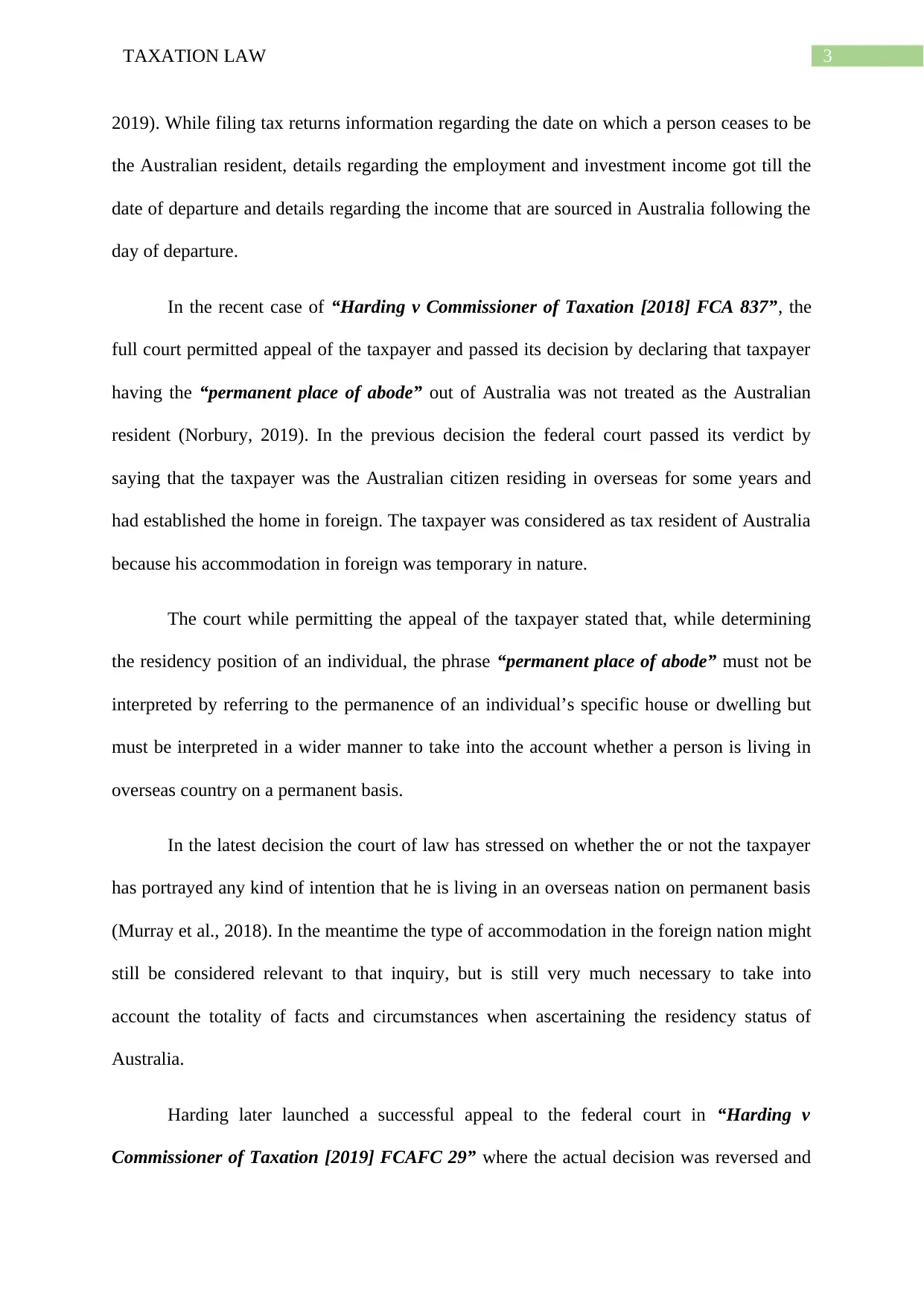
3TAXATION LAW
2019). While filing tax returns information regarding the date on which a person ceases to be
the Australian resident, details regarding the employment and investment income got till the
date of departure and details regarding the income that are sourced in Australia following the
day of departure.
In the recent case of “Harding v Commissioner of Taxation [2018] FCA 837”, the
full court permitted appeal of the taxpayer and passed its decision by declaring that taxpayer
having the “permanent place of abode” out of Australia was not treated as the Australian
resident (Norbury, 2019). In the previous decision the federal court passed its verdict by
saying that the taxpayer was the Australian citizen residing in overseas for some years and
had established the home in foreign. The taxpayer was considered as tax resident of Australia
because his accommodation in foreign was temporary in nature.
The court while permitting the appeal of the taxpayer stated that, while determining
the residency position of an individual, the phrase “permanent place of abode” must not be
interpreted by referring to the permanence of an individual’s specific house or dwelling but
must be interpreted in a wider manner to take into the account whether a person is living in
overseas country on a permanent basis.
In the latest decision the court of law has stressed on whether the or not the taxpayer
has portrayed any kind of intention that he is living in an overseas nation on permanent basis
(Murray et al., 2018). In the meantime the type of accommodation in the foreign nation might
still be considered relevant to that inquiry, but is still very much necessary to take into
account the totality of facts and circumstances when ascertaining the residency status of
Australia.
Harding later launched a successful appeal to the federal court in “Harding v
Commissioner of Taxation [2019] FCAFC 29” where the actual decision was reversed and
2019). While filing tax returns information regarding the date on which a person ceases to be
the Australian resident, details regarding the employment and investment income got till the
date of departure and details regarding the income that are sourced in Australia following the
day of departure.
In the recent case of “Harding v Commissioner of Taxation [2018] FCA 837”, the
full court permitted appeal of the taxpayer and passed its decision by declaring that taxpayer
having the “permanent place of abode” out of Australia was not treated as the Australian
resident (Norbury, 2019). In the previous decision the federal court passed its verdict by
saying that the taxpayer was the Australian citizen residing in overseas for some years and
had established the home in foreign. The taxpayer was considered as tax resident of Australia
because his accommodation in foreign was temporary in nature.
The court while permitting the appeal of the taxpayer stated that, while determining
the residency position of an individual, the phrase “permanent place of abode” must not be
interpreted by referring to the permanence of an individual’s specific house or dwelling but
must be interpreted in a wider manner to take into the account whether a person is living in
overseas country on a permanent basis.
In the latest decision the court of law has stressed on whether the or not the taxpayer
has portrayed any kind of intention that he is living in an overseas nation on permanent basis
(Murray et al., 2018). In the meantime the type of accommodation in the foreign nation might
still be considered relevant to that inquiry, but is still very much necessary to take into
account the totality of facts and circumstances when ascertaining the residency status of
Australia.
Harding later launched a successful appeal to the federal court in “Harding v
Commissioner of Taxation [2019] FCAFC 29” where the actual decision was reversed and
Paraphrase This Document
Need a fresh take? Get an instant paraphrase of this document with our AI Paraphraser
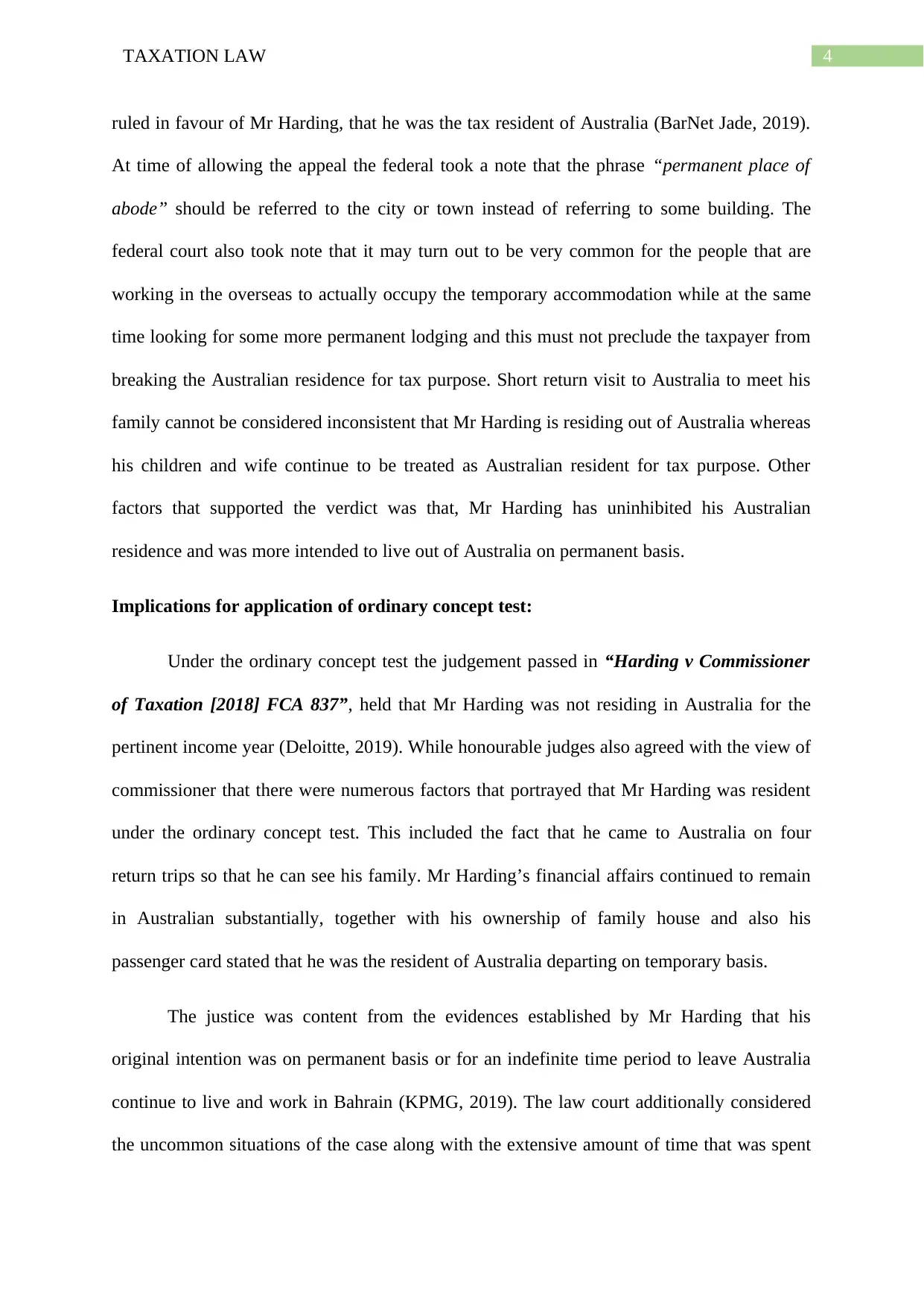
4TAXATION LAW
ruled in favour of Mr Harding, that he was the tax resident of Australia (BarNet Jade, 2019).
At time of allowing the appeal the federal took a note that the phrase “permanent place of
abode” should be referred to the city or town instead of referring to some building. The
federal court also took note that it may turn out to be very common for the people that are
working in the overseas to actually occupy the temporary accommodation while at the same
time looking for some more permanent lodging and this must not preclude the taxpayer from
breaking the Australian residence for tax purpose. Short return visit to Australia to meet his
family cannot be considered inconsistent that Mr Harding is residing out of Australia whereas
his children and wife continue to be treated as Australian resident for tax purpose. Other
factors that supported the verdict was that, Mr Harding has uninhibited his Australian
residence and was more intended to live out of Australia on permanent basis.
Implications for application of ordinary concept test:
Under the ordinary concept test the judgement passed in “Harding v Commissioner
of Taxation [2018] FCA 837”, held that Mr Harding was not residing in Australia for the
pertinent income year (Deloitte, 2019). While honourable judges also agreed with the view of
commissioner that there were numerous factors that portrayed that Mr Harding was resident
under the ordinary concept test. This included the fact that he came to Australia on four
return trips so that he can see his family. Mr Harding’s financial affairs continued to remain
in Australian substantially, together with his ownership of family house and also his
passenger card stated that he was the resident of Australia departing on temporary basis.
The justice was content from the evidences established by Mr Harding that his
original intention was on permanent basis or for an indefinite time period to leave Australia
continue to live and work in Bahrain (KPMG, 2019). The law court additionally considered
the uncommon situations of the case along with the extensive amount of time that was spent
ruled in favour of Mr Harding, that he was the tax resident of Australia (BarNet Jade, 2019).
At time of allowing the appeal the federal took a note that the phrase “permanent place of
abode” should be referred to the city or town instead of referring to some building. The
federal court also took note that it may turn out to be very common for the people that are
working in the overseas to actually occupy the temporary accommodation while at the same
time looking for some more permanent lodging and this must not preclude the taxpayer from
breaking the Australian residence for tax purpose. Short return visit to Australia to meet his
family cannot be considered inconsistent that Mr Harding is residing out of Australia whereas
his children and wife continue to be treated as Australian resident for tax purpose. Other
factors that supported the verdict was that, Mr Harding has uninhibited his Australian
residence and was more intended to live out of Australia on permanent basis.
Implications for application of ordinary concept test:
Under the ordinary concept test the judgement passed in “Harding v Commissioner
of Taxation [2018] FCA 837”, held that Mr Harding was not residing in Australia for the
pertinent income year (Deloitte, 2019). While honourable judges also agreed with the view of
commissioner that there were numerous factors that portrayed that Mr Harding was resident
under the ordinary concept test. This included the fact that he came to Australia on four
return trips so that he can see his family. Mr Harding’s financial affairs continued to remain
in Australian substantially, together with his ownership of family house and also his
passenger card stated that he was the resident of Australia departing on temporary basis.
The justice was content from the evidences established by Mr Harding that his
original intention was on permanent basis or for an indefinite time period to leave Australia
continue to live and work in Bahrain (KPMG, 2019). The law court additionally considered
the uncommon situations of the case along with the extensive amount of time that was spent
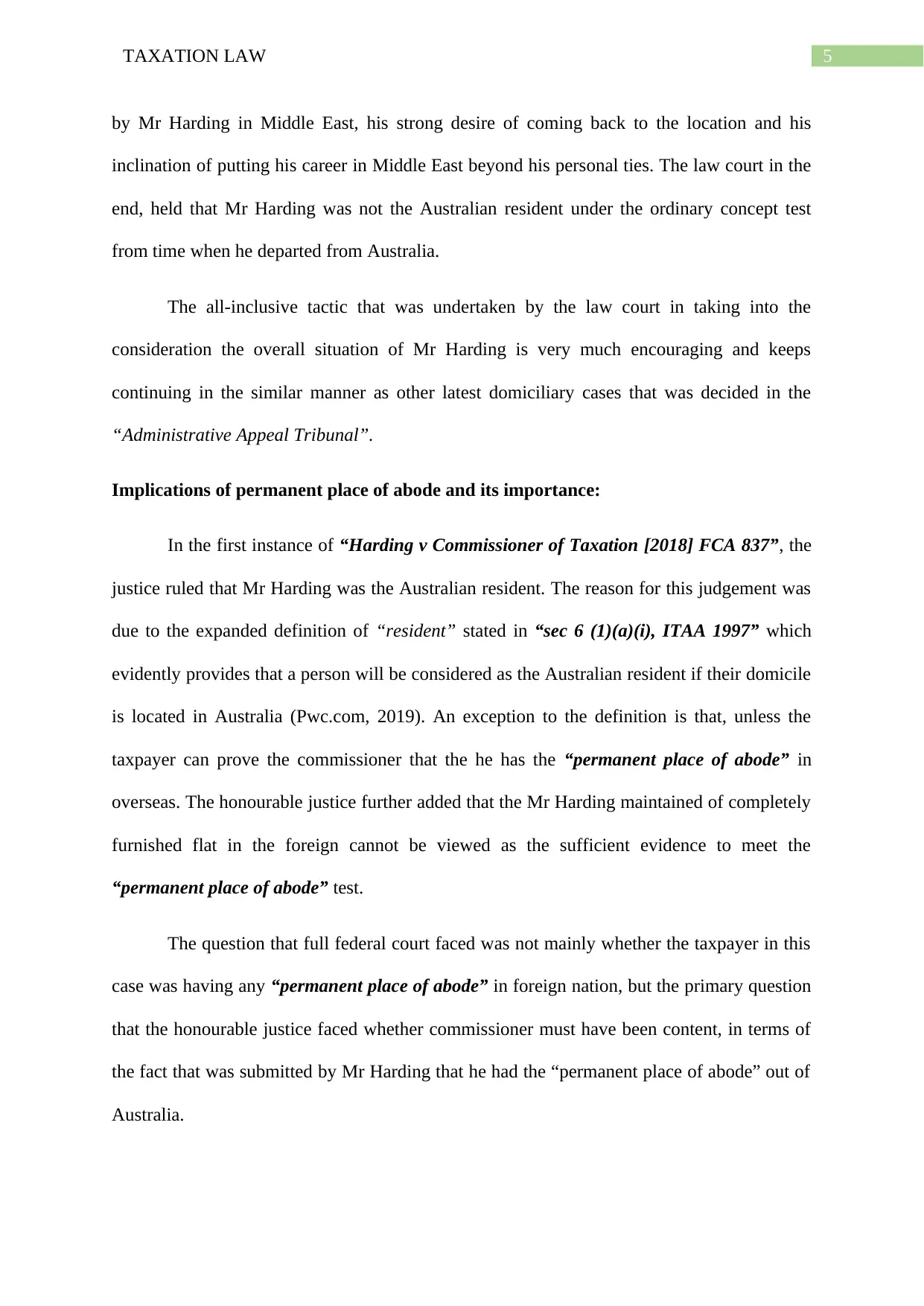
5TAXATION LAW
by Mr Harding in Middle East, his strong desire of coming back to the location and his
inclination of putting his career in Middle East beyond his personal ties. The law court in the
end, held that Mr Harding was not the Australian resident under the ordinary concept test
from time when he departed from Australia.
The all-inclusive tactic that was undertaken by the law court in taking into the
consideration the overall situation of Mr Harding is very much encouraging and keeps
continuing in the similar manner as other latest domiciliary cases that was decided in the
“Administrative Appeal Tribunal”.
Implications of permanent place of abode and its importance:
In the first instance of “Harding v Commissioner of Taxation [2018] FCA 837”, the
justice ruled that Mr Harding was the Australian resident. The reason for this judgement was
due to the expanded definition of “resident” stated in “sec 6 (1)(a)(i), ITAA 1997” which
evidently provides that a person will be considered as the Australian resident if their domicile
is located in Australia (Pwc.com, 2019). An exception to the definition is that, unless the
taxpayer can prove the commissioner that the he has the “permanent place of abode” in
overseas. The honourable justice further added that the Mr Harding maintained of completely
furnished flat in the foreign cannot be viewed as the sufficient evidence to meet the
“permanent place of abode” test.
The question that full federal court faced was not mainly whether the taxpayer in this
case was having any “permanent place of abode” in foreign nation, but the primary question
that the honourable justice faced whether commissioner must have been content, in terms of
the fact that was submitted by Mr Harding that he had the “permanent place of abode” out of
Australia.
by Mr Harding in Middle East, his strong desire of coming back to the location and his
inclination of putting his career in Middle East beyond his personal ties. The law court in the
end, held that Mr Harding was not the Australian resident under the ordinary concept test
from time when he departed from Australia.
The all-inclusive tactic that was undertaken by the law court in taking into the
consideration the overall situation of Mr Harding is very much encouraging and keeps
continuing in the similar manner as other latest domiciliary cases that was decided in the
“Administrative Appeal Tribunal”.
Implications of permanent place of abode and its importance:
In the first instance of “Harding v Commissioner of Taxation [2018] FCA 837”, the
justice ruled that Mr Harding was the Australian resident. The reason for this judgement was
due to the expanded definition of “resident” stated in “sec 6 (1)(a)(i), ITAA 1997” which
evidently provides that a person will be considered as the Australian resident if their domicile
is located in Australia (Pwc.com, 2019). An exception to the definition is that, unless the
taxpayer can prove the commissioner that the he has the “permanent place of abode” in
overseas. The honourable justice further added that the Mr Harding maintained of completely
furnished flat in the foreign cannot be viewed as the sufficient evidence to meet the
“permanent place of abode” test.
The question that full federal court faced was not mainly whether the taxpayer in this
case was having any “permanent place of abode” in foreign nation, but the primary question
that the honourable justice faced whether commissioner must have been content, in terms of
the fact that was submitted by Mr Harding that he had the “permanent place of abode” out of
Australia.
⊘ This is a preview!⊘
Do you want full access?
Subscribe today to unlock all pages.

Trusted by 1+ million students worldwide
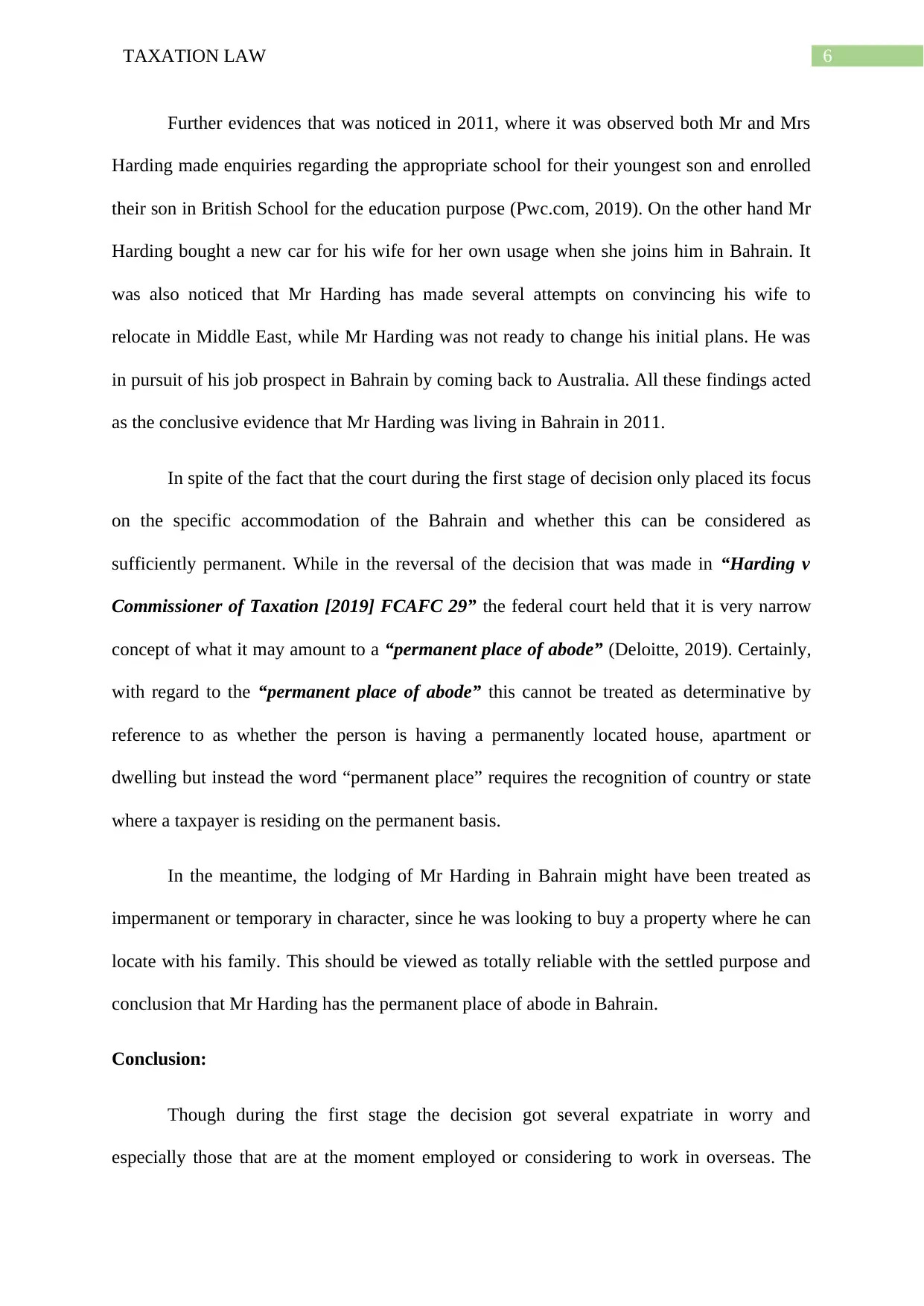
6TAXATION LAW
Further evidences that was noticed in 2011, where it was observed both Mr and Mrs
Harding made enquiries regarding the appropriate school for their youngest son and enrolled
their son in British School for the education purpose (Pwc.com, 2019). On the other hand Mr
Harding bought a new car for his wife for her own usage when she joins him in Bahrain. It
was also noticed that Mr Harding has made several attempts on convincing his wife to
relocate in Middle East, while Mr Harding was not ready to change his initial plans. He was
in pursuit of his job prospect in Bahrain by coming back to Australia. All these findings acted
as the conclusive evidence that Mr Harding was living in Bahrain in 2011.
In spite of the fact that the court during the first stage of decision only placed its focus
on the specific accommodation of the Bahrain and whether this can be considered as
sufficiently permanent. While in the reversal of the decision that was made in “Harding v
Commissioner of Taxation [2019] FCAFC 29” the federal court held that it is very narrow
concept of what it may amount to a “permanent place of abode” (Deloitte, 2019). Certainly,
with regard to the “permanent place of abode” this cannot be treated as determinative by
reference to as whether the person is having a permanently located house, apartment or
dwelling but instead the word “permanent place” requires the recognition of country or state
where a taxpayer is residing on the permanent basis.
In the meantime, the lodging of Mr Harding in Bahrain might have been treated as
impermanent or temporary in character, since he was looking to buy a property where he can
locate with his family. This should be viewed as totally reliable with the settled purpose and
conclusion that Mr Harding has the permanent place of abode in Bahrain.
Conclusion:
Though during the first stage the decision got several expatriate in worry and
especially those that are at the moment employed or considering to work in overseas. The
Further evidences that was noticed in 2011, where it was observed both Mr and Mrs
Harding made enquiries regarding the appropriate school for their youngest son and enrolled
their son in British School for the education purpose (Pwc.com, 2019). On the other hand Mr
Harding bought a new car for his wife for her own usage when she joins him in Bahrain. It
was also noticed that Mr Harding has made several attempts on convincing his wife to
relocate in Middle East, while Mr Harding was not ready to change his initial plans. He was
in pursuit of his job prospect in Bahrain by coming back to Australia. All these findings acted
as the conclusive evidence that Mr Harding was living in Bahrain in 2011.
In spite of the fact that the court during the first stage of decision only placed its focus
on the specific accommodation of the Bahrain and whether this can be considered as
sufficiently permanent. While in the reversal of the decision that was made in “Harding v
Commissioner of Taxation [2019] FCAFC 29” the federal court held that it is very narrow
concept of what it may amount to a “permanent place of abode” (Deloitte, 2019). Certainly,
with regard to the “permanent place of abode” this cannot be treated as determinative by
reference to as whether the person is having a permanently located house, apartment or
dwelling but instead the word “permanent place” requires the recognition of country or state
where a taxpayer is residing on the permanent basis.
In the meantime, the lodging of Mr Harding in Bahrain might have been treated as
impermanent or temporary in character, since he was looking to buy a property where he can
locate with his family. This should be viewed as totally reliable with the settled purpose and
conclusion that Mr Harding has the permanent place of abode in Bahrain.
Conclusion:
Though during the first stage the decision got several expatriate in worry and
especially those that are at the moment employed or considering to work in overseas. The
Paraphrase This Document
Need a fresh take? Get an instant paraphrase of this document with our AI Paraphraser

7TAXATION LAW
main answer to the question is that whether a person that has set up the “permanent place of
abode” in foreign country must be viewed in simple and collective way by taking into
account whether the taxpayer only has the transitory domicile in that country. The decision of
the court is winning situation for expatriates that are going in overseas. The court has struck
balance by emphasis on the type of accommodation acquired by taxpayer in overseas nation
enduringly.
main answer to the question is that whether a person that has set up the “permanent place of
abode” in foreign country must be viewed in simple and collective way by taking into
account whether the taxpayer only has the transitory domicile in that country. The decision of
the court is winning situation for expatriates that are going in overseas. The court has struck
balance by emphasis on the type of accommodation acquired by taxpayer in overseas nation
enduringly.
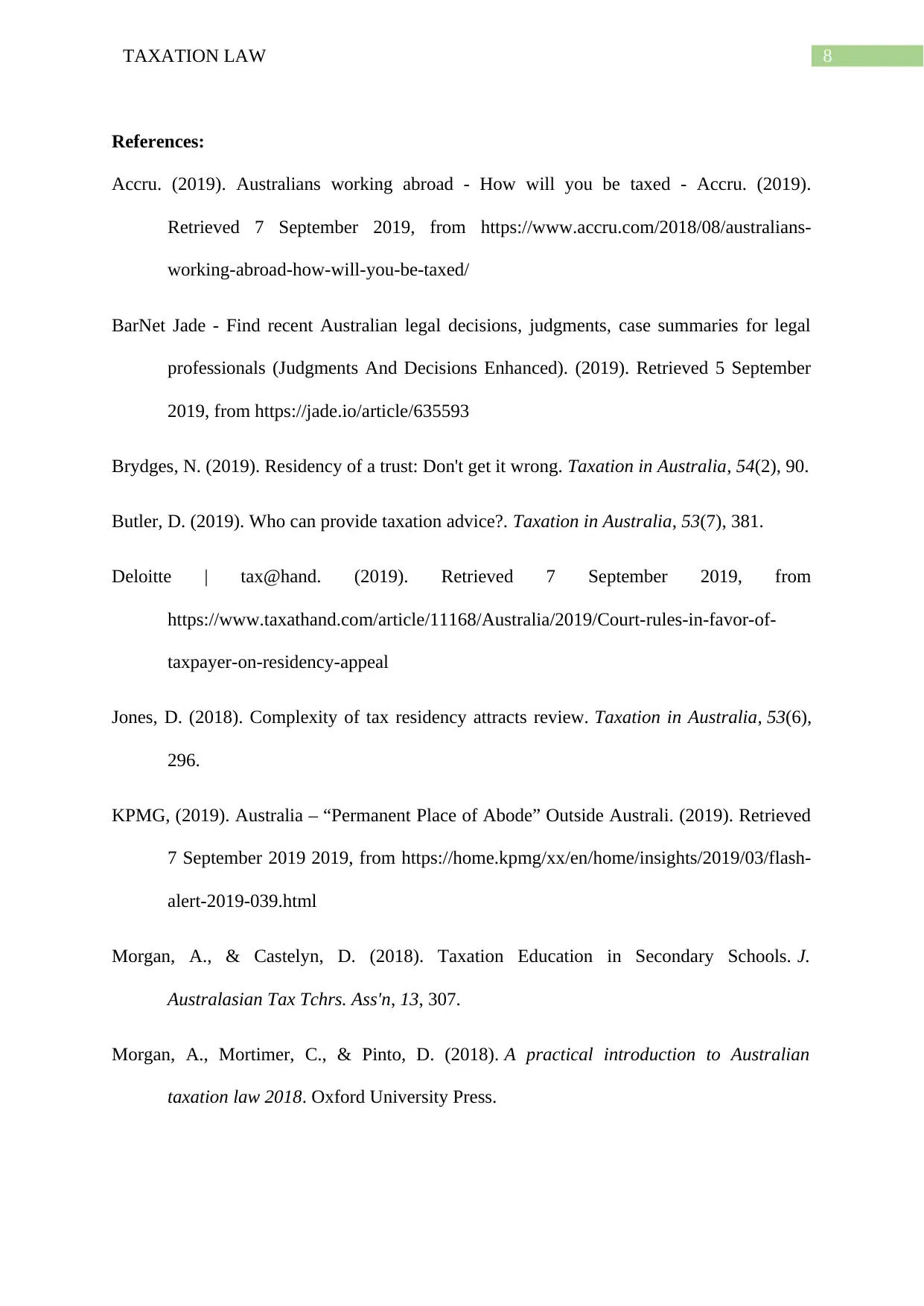
8TAXATION LAW
References:
Accru. (2019). Australians working abroad - How will you be taxed - Accru. (2019).
Retrieved 7 September 2019, from https://www.accru.com/2018/08/australians-
working-abroad-how-will-you-be-taxed/
BarNet Jade - Find recent Australian legal decisions, judgments, case summaries for legal
professionals (Judgments And Decisions Enhanced). (2019). Retrieved 5 September
2019, from https://jade.io/article/635593
Brydges, N. (2019). Residency of a trust: Don't get it wrong. Taxation in Australia, 54(2), 90.
Butler, D. (2019). Who can provide taxation advice?. Taxation in Australia, 53(7), 381.
Deloitte | tax@hand. (2019). Retrieved 7 September 2019, from
https://www.taxathand.com/article/11168/Australia/2019/Court-rules-in-favor-of-
taxpayer-on-residency-appeal
Jones, D. (2018). Complexity of tax residency attracts review. Taxation in Australia, 53(6),
296.
KPMG, (2019). Australia – “Permanent Place of Abode” Outside Australi. (2019). Retrieved
7 September 2019 2019, from https://home.kpmg/xx/en/home/insights/2019/03/flash-
alert-2019-039.html
Morgan, A., & Castelyn, D. (2018). Taxation Education in Secondary Schools. J.
Australasian Tax Tchrs. Ass'n, 13, 307.
Morgan, A., Mortimer, C., & Pinto, D. (2018). A practical introduction to Australian
taxation law 2018. Oxford University Press.
References:
Accru. (2019). Australians working abroad - How will you be taxed - Accru. (2019).
Retrieved 7 September 2019, from https://www.accru.com/2018/08/australians-
working-abroad-how-will-you-be-taxed/
BarNet Jade - Find recent Australian legal decisions, judgments, case summaries for legal
professionals (Judgments And Decisions Enhanced). (2019). Retrieved 5 September
2019, from https://jade.io/article/635593
Brydges, N. (2019). Residency of a trust: Don't get it wrong. Taxation in Australia, 54(2), 90.
Butler, D. (2019). Who can provide taxation advice?. Taxation in Australia, 53(7), 381.
Deloitte | tax@hand. (2019). Retrieved 7 September 2019, from
https://www.taxathand.com/article/11168/Australia/2019/Court-rules-in-favor-of-
taxpayer-on-residency-appeal
Jones, D. (2018). Complexity of tax residency attracts review. Taxation in Australia, 53(6),
296.
KPMG, (2019). Australia – “Permanent Place of Abode” Outside Australi. (2019). Retrieved
7 September 2019 2019, from https://home.kpmg/xx/en/home/insights/2019/03/flash-
alert-2019-039.html
Morgan, A., & Castelyn, D. (2018). Taxation Education in Secondary Schools. J.
Australasian Tax Tchrs. Ass'n, 13, 307.
Morgan, A., Mortimer, C., & Pinto, D. (2018). A practical introduction to Australian
taxation law 2018. Oxford University Press.
⊘ This is a preview!⊘
Do you want full access?
Subscribe today to unlock all pages.

Trusted by 1+ million students worldwide
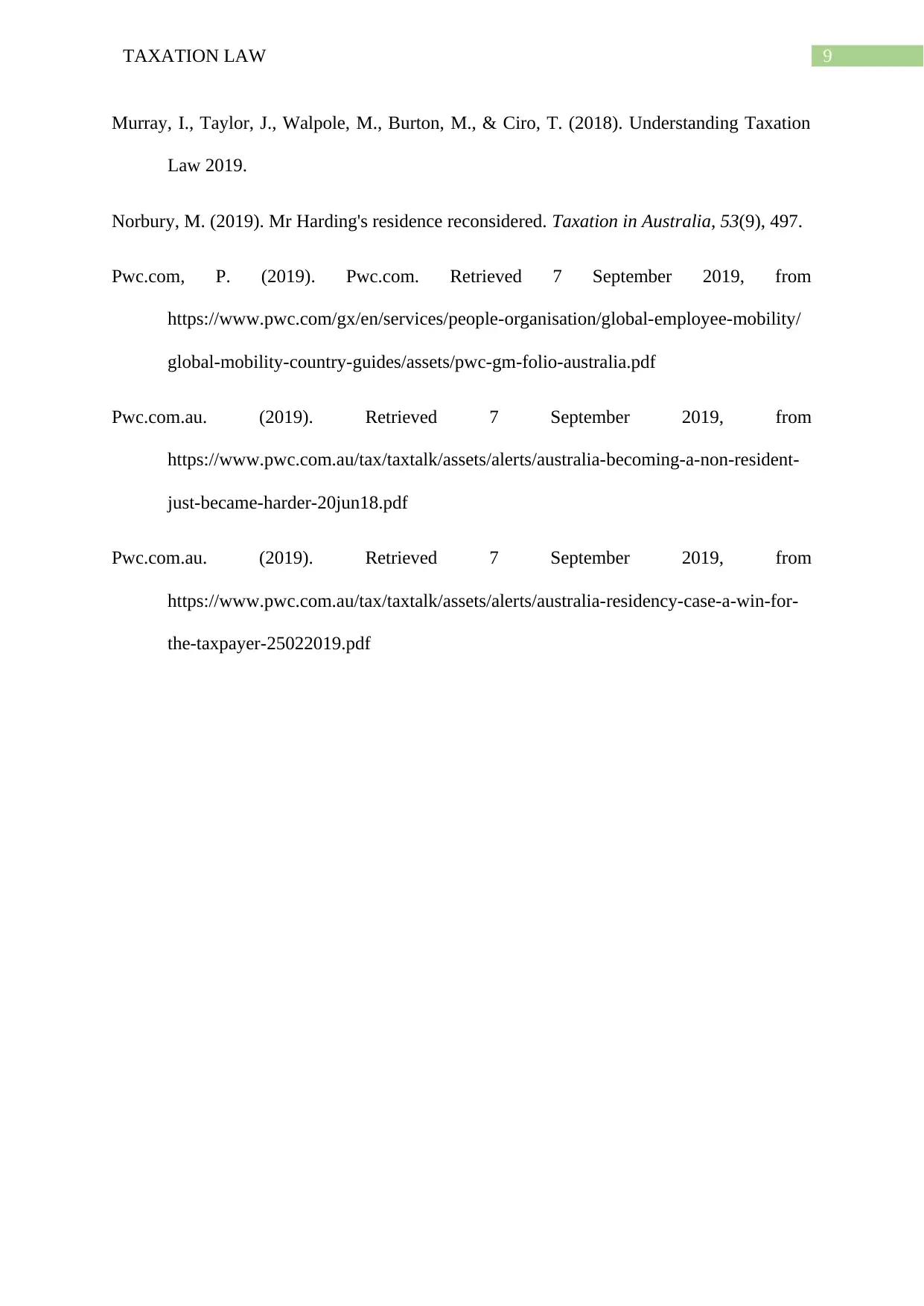
9TAXATION LAW
Murray, I., Taylor, J., Walpole, M., Burton, M., & Ciro, T. (2018). Understanding Taxation
Law 2019.
Norbury, M. (2019). Mr Harding's residence reconsidered. Taxation in Australia, 53(9), 497.
Pwc.com, P. (2019). Pwc.com. Retrieved 7 September 2019, from
https://www.pwc.com/gx/en/services/people-organisation/global-employee-mobility/
global-mobility-country-guides/assets/pwc-gm-folio-australia.pdf
Pwc.com.au. (2019). Retrieved 7 September 2019, from
https://www.pwc.com.au/tax/taxtalk/assets/alerts/australia-becoming-a-non-resident-
just-became-harder-20jun18.pdf
Pwc.com.au. (2019). Retrieved 7 September 2019, from
https://www.pwc.com.au/tax/taxtalk/assets/alerts/australia-residency-case-a-win-for-
the-taxpayer-25022019.pdf
Murray, I., Taylor, J., Walpole, M., Burton, M., & Ciro, T. (2018). Understanding Taxation
Law 2019.
Norbury, M. (2019). Mr Harding's residence reconsidered. Taxation in Australia, 53(9), 497.
Pwc.com, P. (2019). Pwc.com. Retrieved 7 September 2019, from
https://www.pwc.com/gx/en/services/people-organisation/global-employee-mobility/
global-mobility-country-guides/assets/pwc-gm-folio-australia.pdf
Pwc.com.au. (2019). Retrieved 7 September 2019, from
https://www.pwc.com.au/tax/taxtalk/assets/alerts/australia-becoming-a-non-resident-
just-became-harder-20jun18.pdf
Pwc.com.au. (2019). Retrieved 7 September 2019, from
https://www.pwc.com.au/tax/taxtalk/assets/alerts/australia-residency-case-a-win-for-
the-taxpayer-25022019.pdf
1 out of 10
Related Documents
Your All-in-One AI-Powered Toolkit for Academic Success.
+13062052269
info@desklib.com
Available 24*7 on WhatsApp / Email
![[object Object]](/_next/static/media/star-bottom.7253800d.svg)
Unlock your academic potential
Copyright © 2020–2026 A2Z Services. All Rights Reserved. Developed and managed by ZUCOL.




